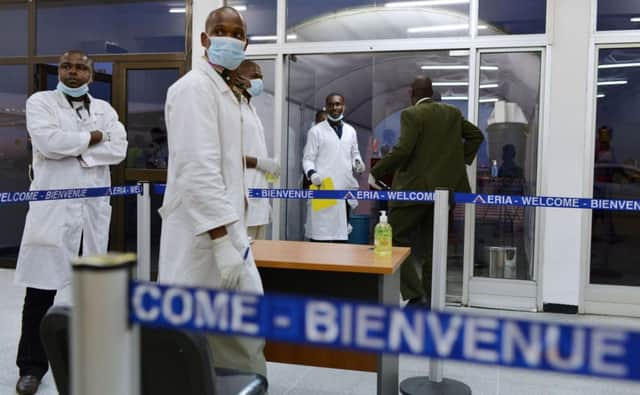Blood transfusion hope for Ebola sufferers


Efforts are now under way in Sierra Leone, Liberia and Guinea to make experimental treatments available in an attempt to slow the escalating number of infections and save lives.
Large-scale vaccine trials, which it is hoped might protect some of those most at risk, including health workers and burial teams, are expected to start in January 2015.
Advertisement
Hide AdAdvertisement
Hide AdBlood from survivors, such as the British nurse Will Pooley, contains antibodies that could help the immune systems of people with Ebola to fight the virus.
Dr Marie-Paule Kieny, an assistant director general at the WHO, said experts were working to make it possible to use blood in the epidemic-hit countries, where health systems have collapsed.
“It needs to take into consideration the safety of the donor as well as the recipient,” she said at a briefing in Geneva. “Great care must be taken to ensure blood from the transfusions is devoid of infectious agents for Ebola as well as HIV, hepatitis and other dangerous pathogens.”
Capacity to take, test and use the blood of survivors was being set up in all three countries, but would be fastest in Liberia, she said, where she hoped it would be established in the coming weeks. People who catch Ebola may not have the antibodies needed to fight the deadly virus, but survivors’ blood is rich in infection-fighting substances.
Blood will be taken from Ebola survivors in designated facilities that will be set up and running in Liberia within weeks.
Teresa Romero, a Spanish nurse who became the first person to contract Ebola outside West Africa this year, tested negative for the virus after reportedly receiving human blood serum containing antibodies.
However, the treatment has yet to be tested on a wider scale.
The WHO move came as dozens of Ebola survivors were discharged from a treatment centre near Sierra Leone’s capital and told they were virus-free yesterday.
Advertisement
Hide AdAdvertisement
Hide AdThe group released from the Hastings treatment centre in Freetown, which included 45 patients, were also issued with health certificates that they proudly held up.
Hawanatu Turay, 14, said she was happy to be feeling healthy again. “I feel good because nothing hurts me anymore and I am feeling fine – I can do anything I want to do. I am happy, I can eat fine, my stomach hurts no more, my head aches no more and also my neck. Nothing hurts and I have no more pains.”
She is among only 130 patients who have been treated and released from the facility.
Such releases are glimmers of hope in an outbreak that has infected some 9,000 people and killed more than 4,500 in the hardest-hit countries in West Africa: Sierra Leone, Liberia and Guinea.
Meanwhile, David Cameron is to urge fellow EU leaders to do more to tackle Ebola in West Africa, warning that failure to halt the killer disease there would risk future cases in Europe.